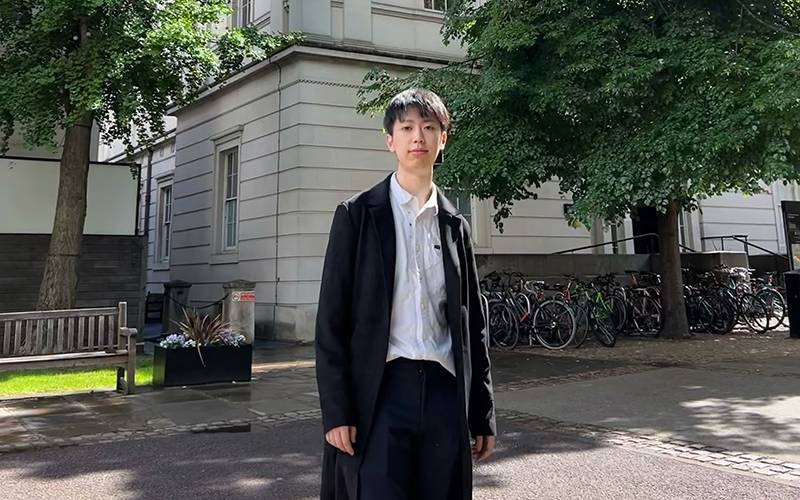Yiang is a student on the Social Sciences with Data Science BSc, class of 2022. He talks about diving right into all the opportunities available at UCL.

What were your first impressions of UCL?
My first impression of UCL was its outstanding academic and industry reputation. During my undergraduate studies, UCL was continuously ranked as one of the top-10 universities globally on the QS ranking and remained robust in other rankings.
What did you enjoy most about your degree programme?
I think the unique aspect of my BSc is that it offers two streams of courses in Social Sciences and Data Science. First, in the data science modules at UCL Q-Step centre, we learnt statistical and programming techniques that can be readily applied in social science research. Among Data Science modules at different levels, I most enjoyed Causal Analysis in Data Science offered in Year 3. In this module, we learned different causal frameworks for social science research and applied the data analysis techniques acquired from the previous two years. While the content first appears challenging, the lecturer, Dr Julia de Romémont, was immensely helpful in answering our questions and giving an insightful lecture. After taking the module, I felt great confidence in applying my data analysis in R (a programming language) and social research skills widely in academia and industry.
Secondly, in the social sciences modules at the Social Research Institute, we covered social science theories alongside seminal literature in different fields including sociology, economics, and public policy which will enable us to ask meaningful social research questions and build our knowledge foundation. I would say all of the modules I have taken are immensely helpful and informative. One example would be the Social Inequality and Mobility module led by Professor Tak Wing Chan. In the module, we were introduced to a rich range of research on social inequality and mobility. We studied different dimensions of inequality, such as social class, income, educational attainment, gender, and race and ethnicity. This module's knowledge enabled me to participate in an ongoing research project examining the relationship between social mobility and health.
What is the biggest challenge you face while studying?
As a first-generation student studying overseas, I encountered inevitable difficulties initially to genuinely adapt to the brand-new cultural habitus. Thus, as soon as I was able to embrace the changes, I served as an academic mentor to assist my junior fellows with their academic and living experience.
How did you find the support from the staff at UCL?
I had great help from my programme leaders, Dr Hedvig Horváth and Dr Maria Sironi. They have supported me and my peers in our undergraduate studies. When they understood we might experience challenges in applying R skills in our assessments and dissertation, they helped set up an R workshop. They have also helped me review my personal statement and decide on the postgraduate university for my postgraduate applications. Moreover, they have also guided me on how to proceed in the coming years before becoming a social researcher. The support from UCL programme leaders is not only enlightening to my academic studies but also for burgeoning personal development.
What did you do when you were not studying?
During my undergraduate study, I led the 'UCL Connect.ed Society' as the Principal Officer (Treasurer). I led the academic society to initiate the Research Mentorship Programme, which enabled dozens of undergraduate students to participate in ongoing research projects at UCL led by PhD students and professors. Over three years of my undergraduate studies, this programme benefited over five hundred students to engage in academic research at UCL actively. Additionally, we facilitated dozens of academic discussion panels to encourage students from different academic disciplines to discuss societal problems. We were awarded the Opportunity Award and Best Academic Society by the UCL Students’ Union.
Over three years of my undergraduate studies, this programme benefited over five hundred students to engage in academic research at UCL actively.“
What do you hope to do after completing your degree and have you used any of the services provided by UCL Careers?
I will study for my postgraduate degree in Computational Social Science at the University of Chicago. Afterwards, I hope to pursue doctoral studies and work as a social researcher. I have used the UCL Careers quite frequently. In my first week of undergraduate studies, I booked a meeting with them and asked them about my potential career directions in academia and industry. During my third year, I applied for summer internship positions in data science, and I asked them for feedback on my cover letters and CV. With their help, I was hired as an Intern Data Engineer at Oxwash, a technological company in London. Also, when I was applying for postgraduate programmes, I asked them for comments on my statement of purpose. I have found their feedback immensely helpful.
Have you benefited from any work experience or internships offered by UCL?
I have worked as a Research Assistant (RA) under Dr Bilal Nasim, Dr Hedvig Horvath, and Professor Alex Bryson to study the causal impacts of teachers’ pay decentralisation reform in 2013 on teacher retention and student attainment. I collected and re-coded five years of teacher pay reform policies from 152 local education authorities in England. Then, I applied the techniques from UCL Q-Step Data Science modules to perform data analysis, multilevel regression analysis, quantitative text analysis, spatial mapping, and data visualisation with R. This RA experience has inspired me to investigate further how the local political control of the authorities affects their teacher pay recommendations for my dissertation. Now, I am looking to publish my dissertation findings.
Sum up your time at UCL in three words....
Rewarding, burgeoning, illuminating.
 Close
Close


